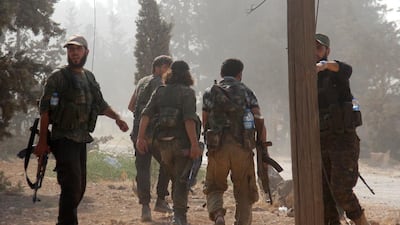In the space of 10 days, Jabhat Fateh Al Sham (JFS) turned from a jihadist group embraced by various rebel forces in Syria to one criticised by the same parties. The shift has valuable lessons for how to deal with the group, which was formerly known as Jabhat Al Nusra.
As the United States pushed for a ceasefire that centred on the targeting of JFS as part of a US-Russian campaign, most of the anti-government forces rejected the agreement. The rebels considered the plan to be favourable to the regime of Bashar Al Assad and opposed the targeting of the effective jihadist force.
The show of solidarity prompted JFS to issue a thank-you letter to those forces, which included groups with which it had previously clashed. The letter referred favourably to rebel factions involved in the fight against ISIL with the help of Turkey in northern Syria – a remarkable move given that those factions were the centre of a new controversy among extremists. Extremist clerics said that because they consider the Turkish armed forces to be apostate, co-operating with them could amount to apostasy.
Ten days after this show of solidarity and a few days after the collapse of the ceasefire, JFS changed its tone. The group issued a new letter in which it ruled out cooperation with Turkey and any fighting in northern Syria other than against the regime. The statement said that Washington’s plan to attack JFS had changed matters and that cooperation with the US and Turkey in northern Syria could lead collaborators to excommunication.
This is even though those same rebels had opposed the plan initially, and they had done so at the cost of defying their American backers.
JFS’s fatwa also contradicted another fatwa issued by its closest military ally on the ground, Ahrar Al Sham, and demanded that the latter reconsider its religious opinion. Ahrar Al Sham sanctioned cooperation with Turkey, as did several other groups. Three of the participants in the Turkish-backed Operation Euphrates Shield made a firm declaration that they would continue to fight with Turkey against ISIL and sternly criticised JFS for its position. Opposition to the JFS fatwa also came from two of the main religious councils representing the Syrian rebels inside and outside the country.
The moral of the story is that the US plan to disentangle the rebels from JFS achieved the opposite effect, while the JFS-rebel fracture that Washington desired happened after the failure of the ceasefire when their interests collided.
This episode sums up what it could take to stem the dominance of JFS, and highlights Washington’s disastrously flawed policy towards the group. The attempt to cooperate with Moscow and indirectly with Damascus against JFS and to force the Syrian rebels to dissociate themselves from the group is both unrealistic and counterproductive.
If the Russian-American deal stood a chance of success a week ago, that chance was squandered by Washington’s failure to demand compliance from Russia. Moscow’s onslaught against humanitarian convoys and civilians in Aleppo, and the US failure to exercise its right of ensuring the deal was either implemented or immediately cancelled, complicated the deal many times over.
When JFS’s leader, Abu Muhammad Al Jolani, suggested in his interview on Al Jazeera last week that Washington was helping the Syrian regime, he was capitalising on the sense of anger many in Syria have towards the American position.
The US seeks to refocus efforts into a battle it considers a priority, while it neglects the main and worst battle in the country. Concerns about jihadist groups such as JFS are well known, but the US has failed to justify its silence about foreign militias fighting on the side of the regime. The US does not treat both militant sides as even remotely equal threats and, worse, seems willing to turn a blind eye towards Shia militias fighting in Aleppo while it seeks to cooperate indirectly with them against JFS in the same areas.
If many in Iraq were angered by the US cooperation with pro-government militias defending their areas or helping the army fighting ISIL, attacking JFS under a plan that not only deals in double standards but threatens to upset the balance of power in favour of the regime is a guaranteed disaster.
Washington still hopes to revive the deal with Russia to fight JFS despite its catastrophic failure and the way Russia conducted itself while the deal was supposedly in force. In a joint statement issued on Saturday, the foreign ministers of five western countries, including the US, reaffirmed their commitment to the destruction of JFS and asked Russia to “take extraordinary steps to restore the credibility of our efforts”. In reality, however, only the US can restore the credibility of its effort – and it might already be too late.
Hassan Hassan is a resident fellow at the Tahrir Institute for Middle East Policy and co-author of ISIS: Inside the Army of Terror
On Twitter: @hxhassan

